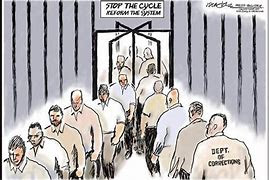Stop the "Revolving Door"
So, how does this relationship begin, where does it come from? Criminalization of homelessness is a huge factor in this continued relationship between homelessness and incarceration. Homelessness is criminalized through laws against camping, panhandling, public urination, the list goes on and on. Further, discrimination in housing is a huge proponent, especially with today’s landlords and homeowners having jurisdiction to perform their own screening and to deny housing based off criminal history regardless of time passed.
Housing is critical, without a proper place of residency one is affected in all areas of reentry into the community, including addiction and health services, securing a job, and pursuing education (Couloute). It is a common belief that has been shown to be true time and time again that we cannot tackle anything in our lives if we first do not have a home where we can have our basic needs met.
Housing first programs have shown true hope and testament to the power of having a place to call home in the lives of those who need the services. One of the dramatic improvements shown from small population samples of housing first programs was fewer police interactions and incarcerations. One specific study was the Denver Supportive Housing Social Impact Bond Initiative (Denver SIB) which was set for five years and provided critical services and a housing first approach to a group of 363 people. The program showed huge success, and immediately tore down the narrative that those experiencing homelessness “wanted to stay on the streets” (Peiffer). Part of the Denver SIB was funded through a social impact bond which comes from private investors and the responsibility of the program to pay them back only exists if the program doesn’t succeed. If it does, then the city pays the investors back, and more, if certain goals are met. These programs are shown to be more cost effective compared to what budget is being allocated for incarceration and emergency services today.
The Denver SIB is just one success story, but we can make more of them. Housing first programs and the decriminalization of homelessness are just two ways to make a change with the “revolving door” relationship between incarceration and homelessness. To truly “shut the door” once and for all we must work together to implement multiple strategies to ensure proper transition between incarceration and reintegration instead of perpetuating punishments long after sentences have been served.
Check out these links to help us collectively raise
awareness and become more educated on the critical issues alive today:
Gender-and-Racial-Justice-in-Housing.pdf
(nwlc.org)
Housing
First | National Low Income Housing Coalition (nlihc.org)
Decriminalizing
Homelessness - HUD Exchange
References:
Couloute, Lucius. “Nowhere to Go:
Homelessness among Formerly Incarcerated People.” Www.prisonpolicy.org,
Aug. 2018,
www.prisonpolicy.org/reports/housing.html#:~:text=We%20find%20that%20people%20experiencing%20cycles%20of%20incarceration.
Peiffer, Emily.
“Housing First Breaks the Homelessness-Jail Cycle.” Urban Institute, 14
July 2021, www.urban.org/features/housing-first-breaks-homelessness-jail-cycle.



Comments
Post a Comment